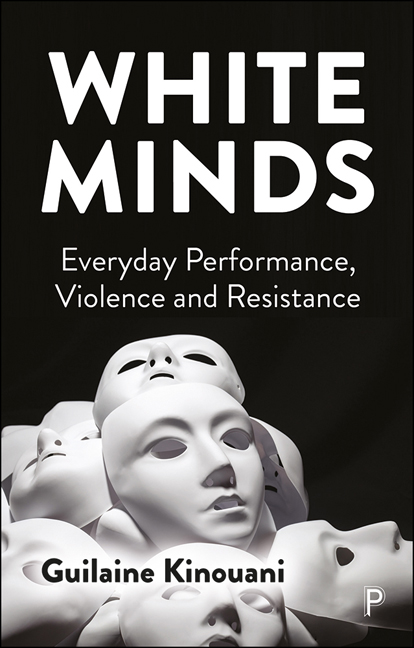Book contents
- Frontmatter
- Dedication
- Contents
- Acknowledgements
- Preface
- Note on language
- Introduction
- 1 Whiteness, time and space
- 2 White gazes
- 3 White envy
- 4 White sadism
- 5 White trauma
- 6 White dissociation
- 7 White shame
- 8 White ambivalence
- 9 White complicity
- Whiteness and resistance: by way of conclusion
- References
- Index
Whiteness and resistance: by way of conclusion
Published online by Cambridge University Press: 28 March 2024
- Frontmatter
- Dedication
- Contents
- Acknowledgements
- Preface
- Note on language
- Introduction
- 1 Whiteness, time and space
- 2 White gazes
- 3 White envy
- 4 White sadism
- 5 White trauma
- 6 White dissociation
- 7 White shame
- 8 White ambivalence
- 9 White complicity
- Whiteness and resistance: by way of conclusion
- References
- Index
Summary
We have a tendency to separate structures from individuals, the ‘past’ from the present, the individual from their group, relationships and environment in ways that can be deeply unhelpful, arbitrary and consistent with Western individualism and modernist formations. White minds has sought to argue that psychological, social, spatial and temporal realities are co-constitutive, inseparable and arguably part of the same phenomena or communicational field.
Although this proposition challenges much of our worldview, being prepared to confront the disorientation it may produce is central to recognising patterns of harm and interrupting processes of repetition, continuation and maintenance that sustain whiteness across time and space.
I have attempted to present a psychosocial analysis of the same. That is to say, an analysis of whiteness grounded in these intersections. An analysis which sought to demonstrate that the internal– external binary, when it comes to race, and any other social phenomena for that matter, is hardly tenable.
My analysis has placed groups racialised as white under the microscope, in doing so subverting the white gaze and transgressing the direction of power. This oppositional gaze has invited us to explore the quotidian workings of whiteness and its everyday performances through personal reflections, stories and anecdotes, thus, through cultural, autoethnographic and historical material. A historicised approach which has provided, I have argued, ‘evidence’ of the production and reproduction, articulation and rearticulation of racialised violence.
‘Evidence’ that sameness and continuation can coexist with change, fragmentation and disruption has established the complex temporality of whiteness. A temporality which is embodied for the postcolonial subject and can be viscerally apprehended through recognisable patterns leading to a sense of knowing without knowing.
We have explored particular dysfunctions and disturbances in white minds resulting from the mobilisation of defences, fantasies and impulses which keep that white bubble intact in the midst of professed concerns for reason, justice and fairness in the white subject. We have sought to confront the psychosocial pathology of whiteness head on.
For the reader racialised as white, such a confrontation is likely to have given rise to difficult feelings, perhaps even some confusion. That disturbance, though, if felt, was already there. It exists within every single part of our society thus in the white body.
- Type
- Chapter
- Information
- White MindsEveryday Performance, Violence and Resistance, pp. 162 - 165Publisher: Bristol University PressPrint publication year: 2023



